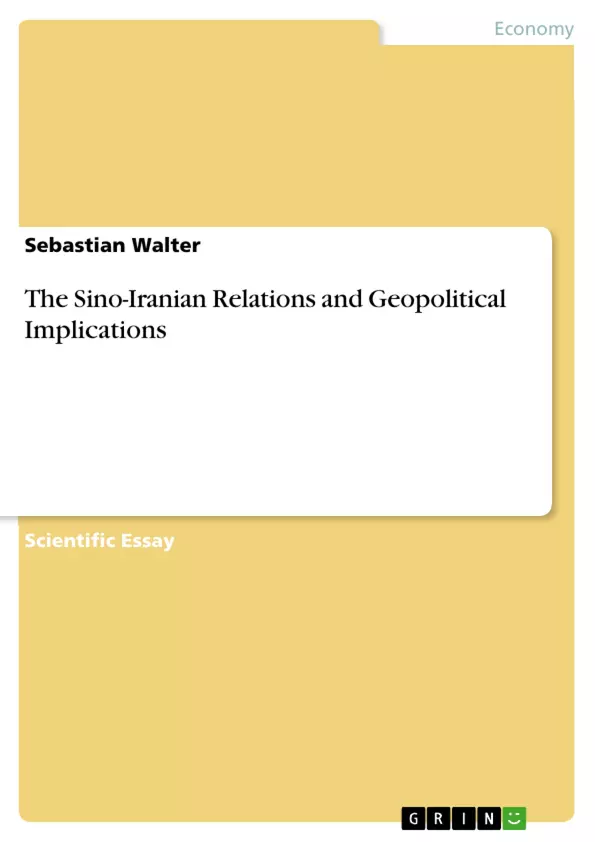This research paper investigates the Sino-Iranian relations in the 21st century. In particular, it examines economic ties, diplomatic and military ties, and ideological and cultural ties. Moreover, the essay gives two main ideas of possible geopolitical implications based on the China’s Iran-relations, particularly in the light of the current nuclear crisis. Firstly, considering China’s embeddedness into the international economy, the paper argues that Beijing would ultimately favour benign relations with the U.S. over further Iran support in order to facilitate its top priority: economic growth. Secondly, looking on Iran’s possible accession to the Shanghai Cooperation Organization, it is argued that the latter would not only hurt Sino-U.S. relations, but also potentially lead to the advancement of Chinese and Russian ideologies. Based on the first implication, this paper views the second implication as rather unlikely.
Inhaltsverzeichnis (Table of Contents)
- Background
- Economic Ties
- Diplomatic and Military Ties
Zielsetzung und Themenschwerpunkte (Objectives and Key Themes)
This essay investigates Sino-Iranian relations in the 21st century, particularly examining economic, diplomatic, military, ideological, and cultural ties. It explores two key geopolitical implications arising from these relations, particularly in the context of the nuclear crisis. These implications are:
- China's preference for benign relations with the U.S. over Iran support to facilitate economic growth.
- The potential impact of Iran's accession to the Shanghai Cooperation Organization (SCO) on Sino-U.S. relations and the advancement of Chinese and Russian ideologies.
- The potential influence of Iranian oil and natural gas reserves on China's energy security and its need to diversify its oil import sources.
- The role of China's military technology exports to Iran and the potential for cooperation in developing Iran's military capabilities.
- The implications of Iran's potential membership in the SCO and its potential to strengthen ties with China, Russia, and India.
Zusammenfassung der Kapitel (Chapter Summaries)
- Background: The essay begins by tracing the history of Sino-Iranian relations, highlighting key milestones and shifts in the relationship from the early 20th century. It emphasizes the shared antagonism towards Moscow, which initially fostered the relationship, and the increasing economic and military ties during the Iran-Iraq War.
- Economic Ties: This section focuses on the crucial role of energy resources in shaping the relationship, analyzing China's growing energy demand and Iran's oil and gas reserves. It describes key energy deals and investments, emphasizing the significance of Iran as a crucial supplier for China's energy security. The section also discusses the relative importance of Iran and China to each other, arguing that China is a more important partner for Iran than vice versa.
- Diplomatic and Military Ties: This section analyzes the diplomatic and military dimensions of Sino-Iranian relations. It explores China's military technology exports to Iran, the potential for cooperation in developing Iranian military capabilities, and the implications of Iran's observer status and potential membership in the Shanghai Cooperation Organization (SCO). The section highlights the potential for Iran to forge closer ties with China, Russia, and India within the SCO framework.
Schlüsselwörter (Keywords)
Sino-Iranian relations, energy security, oil and gas reserves, economic growth, military technology, Shanghai Cooperation Organization (SCO), diplomatic ties, geopolitical implications, nuclear crisis, China's foreign policy, Iran's foreign policy, U.S. foreign policy, Russia's foreign policy.
Frequently Asked Questions
How important is energy security in Sino-Iranian relations?
Very important. Iran's vast oil and gas reserves are crucial for China's growing energy demand and its strategy to diversify import sources.
Does China prioritize the U.S. or Iran?
The paper argues that Beijing ultimately favors benign relations with the U.S. over Iran support to facilitate its top priority: economic growth.
What is the role of the Shanghai Cooperation Organization (SCO)?
Iran's potential accession to the SCO could strengthen ties with China and Russia but might hurt Sino-U.S. relations.
What are the diplomatic and military ties between China and Iran?
China has exported military technology to Iran and cooperated in developing Iran's military capabilities, especially during the Iran-Iraq War.
How does the nuclear crisis affect this relationship?
The crisis forces China to balance its energy interests in Iran with international pressure and its vital economic ties to Western markets.
- Quote paper
- Bachelor of Science Sebastian Walter (Author), 2009, The Sino-Iranian Relations and Geopolitical Implications, Munich, GRIN Verlag, https://www.grin.com/document/140242



